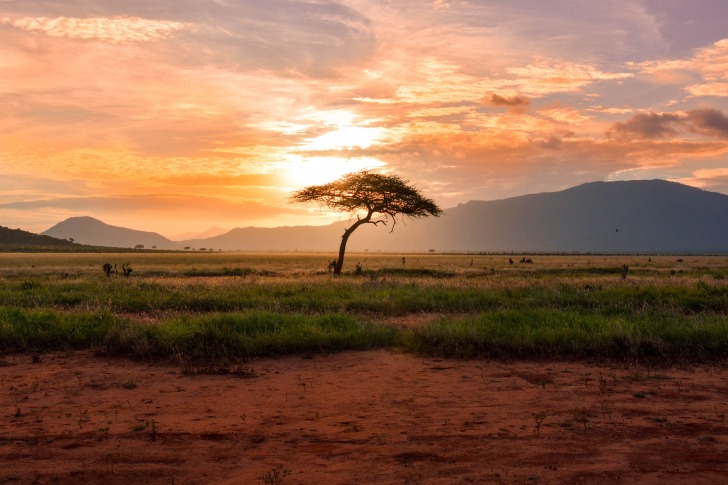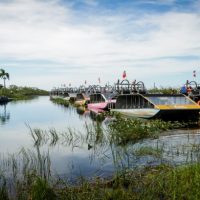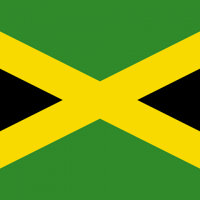Pyjama shark, puffadder shy shark, catshark, and hound shark are just a few of the interesting names for sharks that live in Africa.
On this continent, the majority of sharks are swimming around the South African coast–117 species to be exact.
Cape Town, Sodwana Bay, and Protea Banks are some of the places where sharks swim around the Cape of South Africa.
However, East Africa has approximately 200 species of sharks, making this an even more prominent area for these massive fish.
See where else sharks live and how to swim with these sharks in Africa.
Contents
So… Are There Sharks in Africa?
Yes, many types of sharks live in Africa.
The African continent, extending from Spain and Egypt down to the Cape of Good Hope and Madagascar, is full of flora and fauna.
Lions, tigers, and giraffes are the beginning, followed by the marine life of hundreds of species of sharks.
Northern Africa is home to a few sharks of its own, such as the Phoebodus shark.
This is an ancient type of shark that is 360 million years old.
Whether you are curious about killer sharks including great whites and tigers, or the endemic sharks only in Africa like the Happy Eddie, here are some additional details about these sharks.
South Africa and Eastern Africa, though, are where the majority of sharks live in this country.
Sharks swim up from Australia and the cold waters around Antarctica.
They also inhabit the Pacific and Atlantic oceans that traverse the rest of the globe.
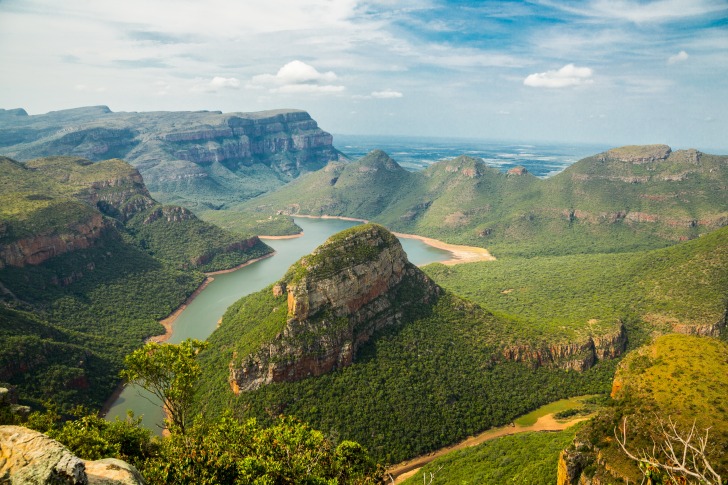
Puffadder Shyshark aka Happy Eddie
The puffadder shy shark goes by a few names, including Happy Eddie and catshark.
This interesting shark is endemic to Western South Africa.
These thin sharks, resembling puffadder snakes, can only be found there and in the Western Indian Ocean.
They only grow to be 24 inches long, making the Happy Eddie one of the smallest sharks in Africa.
As a native to Africa, the puffadder shy shark is the fish that most tourists and newcomers to Africa are most surprised to see swimming in the water.
The names of the puffadder shy shark aka Happy Eddie also bring smiles to many faces.
Great White Sharks
Great white sharks are the most dangerous predator fish on the planet.
They have also lived in the waters around Africa for more than 16 million years, as noted by Right for Education.
While the numbers have been reduced over the years, great white sharks still swim the waters around Africa, especially around the southern and eastern coasts.
Zambezi aka Bull Sharks
Zambezi sharks live in Africa, in both freshwater and saltwater.
These are called bull sharks in the rest of the world, except for Nicaragua where it is called the Lake Nicaragua shark.
The bull shark is most impressive for its ability to live in freshwater and saltwater.
This is how the bull shark gets around so easily, and has spread to so many waterways.
Bull sharks or Zambezi sharks are found in rivers, lagoons, lakes, and oceans around Africa.
They are one of the most common shark species in the water in this country.
Oceanic Whitetip Sharks
The oceanic whitetip shark, aka the shipwreck shark, is, as reported by NOAA Fisheries, a surface-dwelling shark that is at the top of its food chain.
This shark will eat anything from mammals and fish to humans and garbage.
The reason it is called the oceanic whitetip shark is, along with inhabiting the ocean, this 11-foot-long adult shark has white markings on the ends of its fins.
Tiger Sharks
Tiger sharks are another dangerous species of shark living around Africa.
This type of shark is the only member of the genus Galeocerdo.
These are predators and, according to Oceana, “Tiger sharks have been known to bite people, and their rather large size leads to occasional fatalities, particularly in areas where large numbers of people use the ocean, recreationally.”
Whale Sharks
Whale sharks also live in African waters.
These are the world’s biggest sharks, and even though they are large, they are the least threatening.
That is because, as the name suggests, these sharks are also whales, which are harmless mammals.
Whale sharks depend on tiny plankton and krill to make up their diet, not humans.
Is it Safe to Swim in Africa?
If you are planning to swim in Africa, be on the lookout for swimming beaches.
These are the safest places to swim for locals and tourists alike.
Sharks are a common threat, and there are flags that are posted if these fish are seen in the water.
If you see a black flag, this means the water is not safe for swimming.
A white flag with a black shark on it indicates there is a shark actively swimming in the water.
You would want to avoid swimming here, too.
Scout out the flag system when going to African beaches so you can be aware of any pending shark issues.
Otherwise, there are shark nets, which are a controversial barrier to preventing sharks from getting into certain areas.
If you are swimming where there are shark nets, these are used in Africa in some places with some success.
The controversy arises around the way the nets stop sharks and all other marine life from crossing the water, and it can easily trap and kill them, too.
However, if there are shark nets in the water, this is an indication that there are also sharks inhabiting the area.
Be on alert for a shark siren to sound if there are any sharks seen in the waters.
Interesting Shark Facts in Africa
The St. Joseph shark of South Africa is also known as a ratfish or ghost shark.
This shark looks especially curious with its trunk for a nose, just like an elephant’s but shorter.
The goblin shark is also from this area, and it has an equally strange nose.
This shark’s nose is long and thin like a sawfish’s nose.
It makes you wonder why the noses of sharks from South Africa are so strange to look at.
Sharks live in both the freshwater and saltwater of Africa, and there are hundreds of different types of sharks.
Some sharks live in freshwater rivers and shallow waters, which include the Breede River, home to the Zambezi shark.
As one of the most popular sharks in Africa, Zambezi sharks live in both fresh and saltwater.
The Zambezi shark swims and breeds in shallow, warm water on the coasts and in freshwater rivers.
However, most sharks must have at least a 50 percent concentration of salt to survive.
The salt waters of Africa include the Red, Black, Erythraean, Mediterranean, and Levantine seas, as well as the Atlantic and Indian oceans.
These include massive predator sharks like the great white and tiger sharks, as well as whale sharks that need a lot of areas to find enough food.
The size of the ocean is better suited for bigger sharks, too.
You won’t see a great white shark swimming in a lagoon simply because of the small, shallow pool.
If you want to see large sharks around Africa, go to the seas and oceans.
More unique and hard-to-find sharks, like goblin sharks with their obtrusively long noses, are also found in Africa.
These sharks hide in the deepest saltwater of Africa on the sandy shelves under the surface.
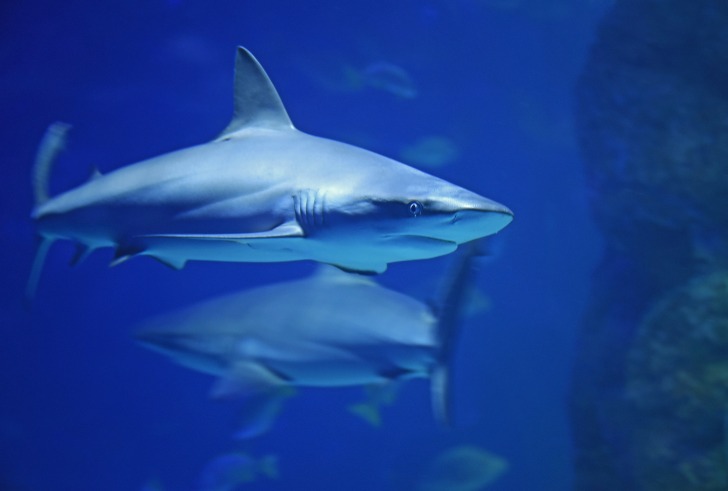
3 Safety Tips for Swimming in Shark-infested Waters
- Avoid wearing bathing suits in bright colors or with metal that is shimmery. Both of these make you look like an attractive but not too mentally aware fish. That is the kind of animal that gets eaten by sharks, or at least targeted for a shark attack. Wear neutral-colored swimming suits, such as blue, green, or tan. Avoid wearing solid black that could look like a seal.
- Do not fish and swim in the same watering hole. If you have been fishing in a river or near a swimming beach, stay out of there. When it is time to take a dip, only swim in swimming accessible beaches. These are waterways that are clear and safe for swimming, and there are often lifeguards on patrol. Also, where there is fish bait, this leads to sharks. If you have been fishing and have disposed of fish heads or carcasses in the water, do not swim in that same area.
- When swimming, if you see a shark or the signs of a shark, such as a triangular fin in the water or a massive feeding frenzy of fish, get out of the water. Sharks swim where they are hunting, and these are predators who eat whatever gets in their way. If you want to swim in the shark-infested waters of Africa, just make sure you can see well. This means avoiding swimming when it is dusk or at night when there is no light.
Summary
There are many species of sharks that are endemic and native to the country, as well as sharks that travel through African waterways.
These include the well-known predator sharks–the great white and tiger sharks–as well as more curious sharks only found in Africa.
Happy Eddie is perhaps the most interesting species of shark that can only live around Africa, for example.
Visiting Africa means running into a shark or a few when swimming.
Therefore, it is important to be prepared for the sharks swimming in Africa before you move or visit this continent.
Sharks are not always deadly, but in Africa, you are going to see a lot more sharks in certain areas, like around the Cape of South Africa.
This is also a popular tourist vacation destination that attracts plenty of unsuspecting swimmers.
Frequently Asked Questions
Are there great white sharks in Africa?
Africa has historically been a habitat for great white sharks.
While the numbers have declined dramatically, Africa has 353 great white sharks compared to 522 of the sharks once tagged here.
In 2021, for relative comparison, how many fatalities from sharks occurred in Africa?
According to the International Shark Attack File, in 2021, Africa reported one fatality from shark attacks in Africa.
This is the same number as in Brazil and New Zealand.
Overall, Africa had three shark bite attacks reported in 2021.
How many sharks live in the Republic of Kenya, which is in East Africa?
There are 38 different kinds of sharks that make Kenyan waters their territory.
That is a lot of sharks for one country on a single continent.
